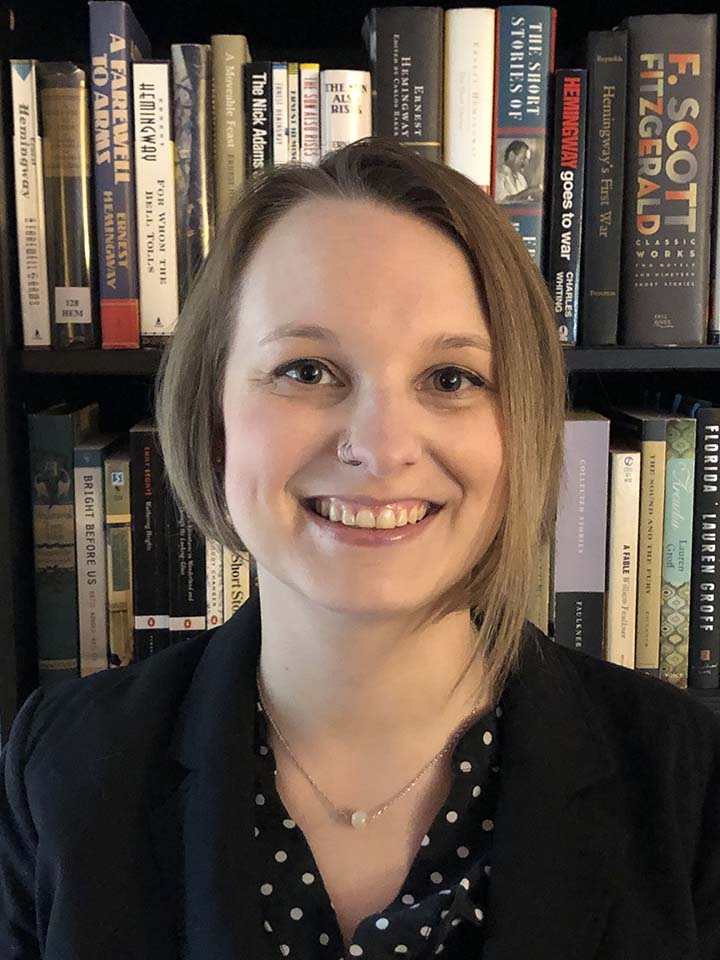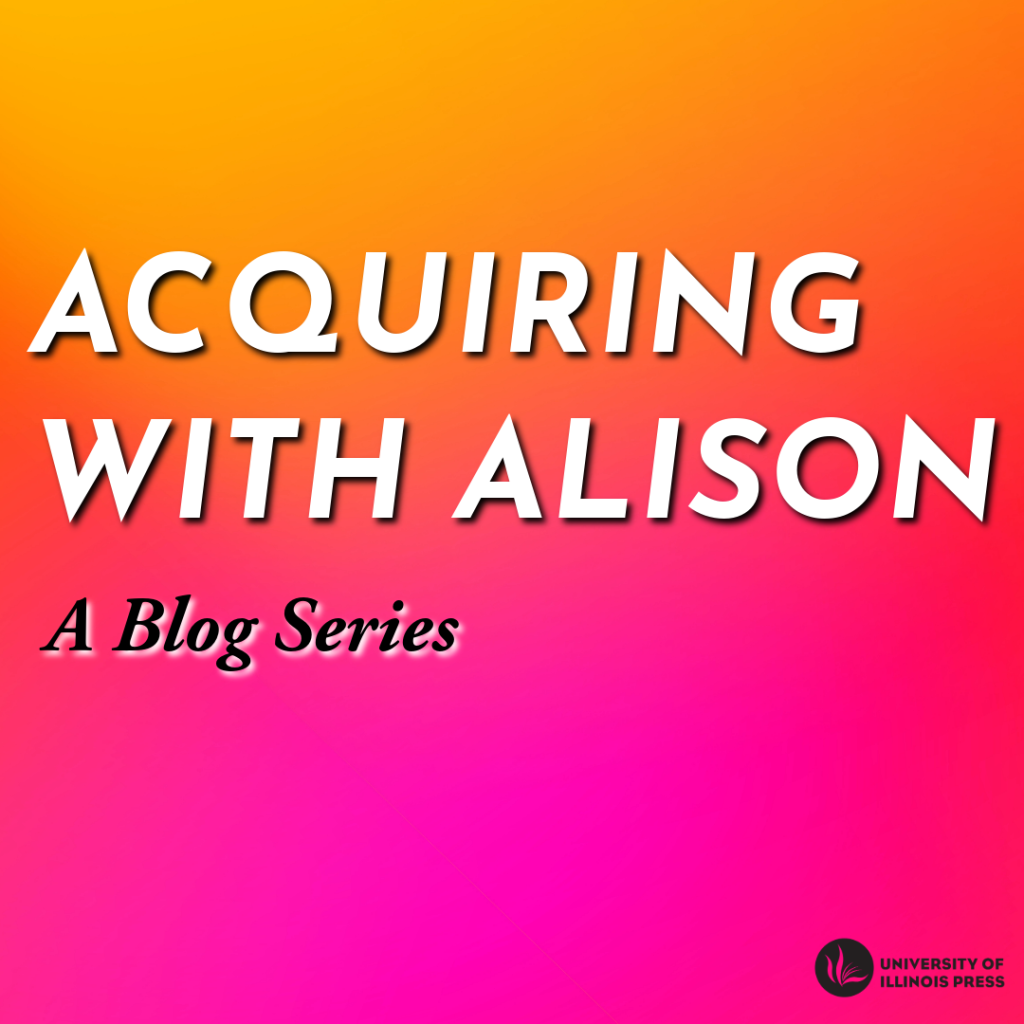Acquisitions (or acquiring) editors live in a liminal space. We are employed by a press, but we spend a lot of time in academia proper, attending conferences, talking to scholars, reading journals, and so on. I probably spend the better part of each week talking to people outside the press, rather than my colleagues inside it. And this is by necessity. A large part of an editor’s role is to translate: we translate each book project to our colleagues at the press, and we translate the book publishing process to each author. We are the in-house advocate for disciplines and book projects, and we are the experts in publishing outside of it.
Acquiring editors specialize in list areas, which loosely map over academic disciplines. For example, I acquire books in history and religion. Within these two areas, I have focused lists in labor, radical studies, migration history, disability history, Illinois and Midwestern history, Mormon studies, and American religious studies more broadly, especially new religious movements. For several of these lists, I also have series, which are usually a further concentration of the list area. For example, the Working Class in American History series focuses on labor history in the United States. Some editors may have PhDs, either in their list areas or others, but we are not primarily content editors regardless of our scholarly background.
To best understand what I do as an acquisitions editor, it might be helpful to walk through the acquisitions process from the point at which I encounter a potential book project until I hand over a project to my colleagues in production.
I start acquiring books in a number of ways. I attend conferences and read journals, and I reach out to people whose work fits in with my list areas. Scholars also reach out to me or to a series editor with their projects. At that point, I often have conversations with authors: what are they working on? What stage are they at? What are their goals for their work? They ask me questions, too, about what I’m interested in and what the publishing process is like at Illinois.
Once I receive material from a prospective author, either a proposal or manuscript, I read it. At this stage, I am looking primarily at how the project fits in with my list. Editors spend a lot of time thinking and talking about fit, by which we mean, does this project work with everything else I am publishing? Do I have the network I need to have this project peer reviewed? Do we have the marketing infrastructure to promote it? If the project does fit with what I’m looking for, I also evaluate it in terms of the writing, format, and structure. If I notice elements that need work, like chapter introductions, I assume that peer reviewers might notice these elements, too—and therefore might not focus on evaluating the scholarship—so I might ask an author to do some revision before peer review. If the author pitched the project for a series, I might also bring in the series editors, who may also ask for revision before peer review.
Peer review is the first official step at the press, and I see conducting peer review as one of my primary functions. Peer review is where I send a proposal or manuscript out for review to two scholars in the field. The process is single anonymous: the reviewer will know who the author is, but the author will not know who the reviewer is, unless the reviewer chooses to reveal their identity. I usually work closely with authors and series editors to understand what kinds of feedback the project needs so that I can determine the best set of reviewers. For example, if the project is at the intersection of labor history and environmental history, then I might want to get one labor historian and one environmental historian to read the manuscript. Or, if the project is strongly interdisciplinary or uses mixed methods, I might want to look for scholars who also use those methods. I also leverage my connections in the field—in terms of people I have published, scholars I’ve talked to at conferences, papers I’ve read—to find the best reviewers for a project.
At Illinois, each reviewer receives a set of guidelines based on the type of project they’re reviewing: proposal, manuscript, edited collection, or trade project. Reviewers can fill out our guidelines as short answers, or they might write a letter or memo that addresses the questions we ask. These questions focus on the project’s intervention, contribution to the field, organization, and source base, while also asking about how it might compare to other books or how a reviewer imagines the book being used in a course. Ultimately reviewers are asked to make a recommendation to publish the project as is, meaning it does not need any revision; publish with optional revisions; publish with required revisions; or decline the project.
I use peer reviewers’ comments and recommendations, together, to determine the next steps. I typically read and consider the reports, and then send them on to the author with a summary of what I see as the most important points in each report. This message serves as a jumping off point for the author and I to discuss the reports, either via email or zoom. What feedback is helpful? What isn’t? How might the author incorporate the feedback? I am usually thinking about how our boards will read the reports, and the author’s response, over the course of our process, and I make suggestions accordingly.
From peer review, if the reports support it and if the author and I are on the same page about next steps, then I can request a contract. At Illinois, this involves creating packets of information, such as sample material, the author’s CV, reports, and the author’s response, which we share with our colleagues.
We also have two contract pathways: advance contract and contract. An advance contract is a contract in advance of the full or final manuscript. We use this for all projects that start as a proposal, or for manuscript projects that require substantial revision such that we would need another round of review. An advance contract is a contract, and authors do not receive another document after approval. On the other hand, we use a contract for full manuscripts that do not require substantial revision, or where the revision is more about the writing and something the editor can handle without further review.
The contract process is where an editor’s advocacy and translation abilities really come into play. To request an advance contract or a contract, I present the project to boards at the press made up of colleagues in other departments, along with our faculty board, made up of professors from our three Illinois campuses. At this point, I want a project to succeed! I’ve invested my time and energy and the press’s resources into the project, and I’ve invested my network, too. But I have to get my colleagues on board. I have to translate the project to them. What are the editorial, design, or production implications of this project? What are the marketing implications? Can my colleagues in these departments leverage the skills they already have, or will a project require something different? Especially if a project requires something different, I need to advocate for why that difference is necessary, and why publishing the project is worthwhile. But I also have to be able to consider my colleagues’ feedback, and communicate that feedback to the author.
Once a project has a contract, I usually work with the author to implement the revisions we agreed upon, and have those revisions reviewed if necessary. We also discuss other elements of the book, like images, format, and cover design. Again, some of these aspects will involve other colleagues at the press, and I need to be able to translate the author’s vision to these colleagues.
When we have all the final materials, I work with my assistant editor to transmit projects to production. There, a production coordinator manages the project through copyediting, design, and proofreading, while designers work on the cover and marketing gets started on plans.
So far, I have described a lot of process-based tasks. I can’t deny that my daily schedule is a long list of tasks, and an assistant editor’s is even more so. However, even though these tasks are critical for what I do, I see myself as primarily a relationship person. Books are the tangible product that I acquire, but relationships are the intangible. I need relationships to help the books be more successful. For example, I might connect with a senior scholar at a conference who isn’t interested in publishing with Illinois; this historian is writing their fourth book and they’ve signed with a trade press. However, I’m interested and invested in connecting with them anyway. This scholar might be a future series editor or peer reviewer. They might recommend their students or colleagues publish with me. They might be a journal editor who will assign my books for review. They might invite me to a talk or seminar where I meet potential authors. By connecting with scholars across the board—both those who I may publish and those I won’t—I get to know and stay plugged into a discipline, and I support the books that I publish in that list area. I might be able to publish books without also building relationships, but it would be a lot harder and a lot less fulfilling.

Alison Syring is an acquisitions editor at the University of Illinois Press. She has degrees in English literature and history from the University of Maryland, an MA in writing from Johns Hopkins University, and an MFA in creative writing from the University of Illinois. She started in publishing as a production editor and worked for several years as a technical writer. Alison began as a Round the Press intern through the graduate English department, after which she was hired as a full-time assistant editor. She has been acquiring in history and religion since 2020. Alison continues to acquire and grow a flagship series—the Working Class in American History series; diversify our Mormon studies list and broaden into religious studies; and maintain our commitment to early-career scholars by starting an Outstanding Dissertation in Disability History prize published through our Disability Histories series.

